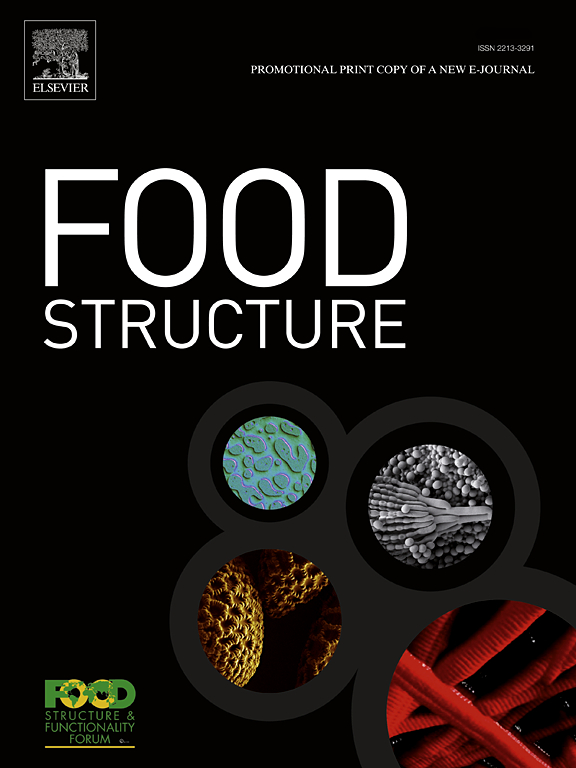Durum wheat oil oleogels: A study on rheological, thermal, and microstructural properties
IF 5.9
3区 农林科学
Q1 FOOD SCIENCE & TECHNOLOGY
引用次数: 0
Abstract
Durum wheat oil (WO) is a by-product obtained during wheat milling process characterized by higher amount of bioactive compounds. In recent years, oleogelification, a novel technique to structure oils was developed to replace saturated and trans fats. The aim of this study was to evaluate the performances of WO to obtain stable oleogels using two natural waxes (beeswax BW and carnauba wax CW) at different ratio (4, 7 and 8 %, w/w) respect to sunflower oil (SO) used as control. Oleogels were analyzed for fundamental rheological properties, microstructure and oil loss. Results showed as a concentration below 7 %, weak networks were observed for all samples because the predominance of viscous moduli (G’’) over elastic ones (G’) and high oil loss. Nevertheless at 8 % of waxes, stability in terms of all analyzed parameters was highlighted for all samples (WO_BW showed the lowest). Moreover, WO samples with 7 % and 8 % of CW displayed very high stability in terms of all considered parameters, also at high temperatures, showing strong networks and reaching the optimum solid-like gel without significant differences respect to SO one. Obtained results highlighted the WO ability to be employed, as alternative to SO to develop oleogels with optimal performances and stability.
硬质小麦油脂凝胶:流变、热和微结构特性研究
硬质小麦油(WO)是小麦碾磨过程中产生的一种副产品,其特点是含有较多的生物活性化合物。近年来,人们开发了油凝胶化这一新型油脂结构技术,以取代饱和脂肪和反式脂肪。本研究旨在评估使用两种天然蜡(蜂蜡 BW 和棕榈蜡 CW)以不同比例(4%、7% 和 8%,w/w)获得稳定油凝胶的 WO 性能,而葵花籽油(SO)则作为对照。对油凝胶的基本流变特性、微观结构和油流失进行了分析。结果表明,当浓度低于 7% 时,所有样品的网络都很薄弱,因为粘模量(G'')比弹性模量(G')大,而且油分损失也很高。然而,当蜡含量达到 8% 时,所有样品在所有分析参数方面的稳定性都很突出(WO_BW 的稳定性最低)。此外,CW 含量为 7% 和 8% 的 WO 样品在所有考虑参数方面都显示出极高的稳定性,在高温下也是如此,显示出很强的网络性,达到了最佳的固态凝胶状态,与 SO 样品没有明显差异。所获得的结果凸显了使用 WO 替代 SO 开发具有最佳性能和稳定性的油凝胶的能力。
本文章由计算机程序翻译,如有差异,请以英文原文为准。
求助全文
约1分钟内获得全文
求助全文
来源期刊

Food Structure-Netherlands
Chemical Engineering-Bioengineering
CiteScore
7.20
自引率
0.00%
发文量
48
期刊介绍:
Food Structure is the premier international forum devoted to the publication of high-quality original research on food structure. The focus of this journal is on food structure in the context of its relationship with molecular composition, processing and macroscopic properties (e.g., shelf stability, sensory properties, etc.). Manuscripts that only report qualitative findings and micrographs and that lack sound hypothesis-driven, quantitative structure-function research are not accepted. Significance of the research findings for the food science community and/or industry must also be highlighted.
 求助内容:
求助内容: 应助结果提醒方式:
应助结果提醒方式:


